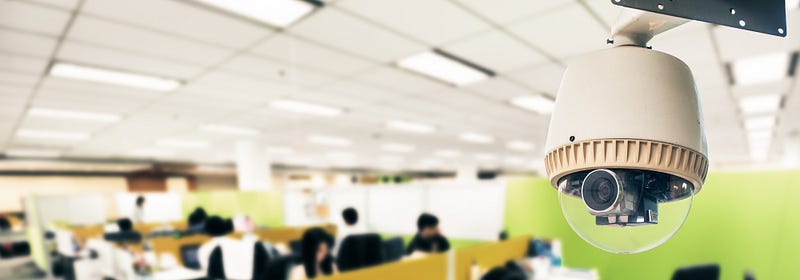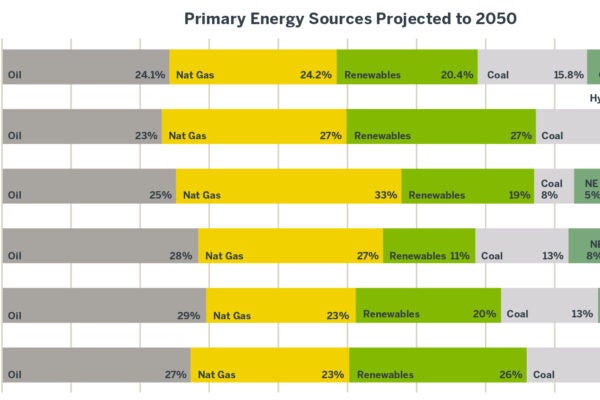Watch Me Work
Workplaces that monitor employees can learn something from police attitudes around wearing body cameras
Based on the research of Shefali Patil

Most of us typically prefer to do our jobs free of constant scrutiny from our employers. But in recent years, as technology advances and remote work increases, especially given the COVID-related demands, employees are finding themselves watched in even more ways on the job.
For police officers, that monitoring comes in the form of the body cameras required by many U.S. law enforcement agencies. Police interactions with the public are now captured and viewed by supervisors, the public, and the officers themselves.
This development has attracted the attention of researchers. “I’ve been studying law enforcement for more than seven years, so I’m trying to see the effects of public scrutiny on officers,” says Shefali Patil, assistant professor of management at Texas McCombs.
“As an organizational psychologist, I’m interested in how employees’ experience is shaped. I wanted to see things through their eyes.” — Shefali Patil
Welcoming Surveillance
Organizational psychologists have long discouraged monitoring of workers, cautioning that employees feel a loss of autonomy — and are therefore less effective — when they’re watched. “Because of that, I’m going to be completely resentful of my supervisor and organization,” Patil says.
However, most officers welcome body cameras. In a new study, Patil points to earlier findings that during the past several years, 95% of large U.S. law enforcement agencies have either committed to or already implemented body cameras, and a majority (66%) of U.S. police officers actively support their adoption, according to a Pew Research Center study.
Why is that? Patil’s paper, co-authored by Ethan S. Bernstein of Harvard Business School, finds that police officers’ concerns about a loss of on-the-job autonomy are balanced out when the officers can access their own body camera footage. Police reported that cameras “show the truth from the officers’ perspective” and “protect officers” accused of misconduct.
“What is traditionally conceived as top-down monitoring is perceived as far more egalitarian when everybody can access the footage,” Patil says.
“Officers, for the first time, have a way to show their side of the story.” — Shefali Patil
That can shrink the divide some officers feel exists between themselves and the people who monitor their job performance.
Polling on Polarization
For the first part of their study, Patil and Bernstein asked police about their perceptions of ability to make on-the-job decisions and polarization with the general public, as well as their political ideologies.
Three months after being outfitted with the cameras, officers felt they had less autonomy — but also felt less polarized from the public they serve. “Polarization is extreme conflict,” Patil says, “so it’s basically ideas like, ‘We don’t share any common values or beliefs.’”
Next, the researchers surveyed police. Their agencies provided five randomly selected videos from the body cameras of each participating officer — for 820 videos in total — which exemplified officers’ psychological states, like autonomy or polarization. Footage included calls involving arson, a DWI arrest, vehicle search, traffic citation, convenience store robbery, suspicious person, and shoplifting. The researchers asked independent experts to code and rate police behaviors caught on camera; officers then rated their own performance and feeling in each situation.
Researchers asked about police behaviors in several ways. “The first was their interpersonal interaction with citizens, ‘How respectful are police towards the people when they’re working a scene?’ The other is how they’re portraying a favorable image of law enforcement in general.”
The independent experts provided comments on the footage that ranged from positive (“Just good professional interaction with a transient being arrested,” “Very good traffic stop/very friendly and professional,” “Played catch with kids while partner took report”) to negative (“This supervisor started out well… then after his officer arrested the person of interest and citizens thanked him, he said they had to put up with more crap these days. Not professional,” “Wow, didn’t even ID them, much less do anything,” “Handled evidence inappropriately”).
Officers were more respectful in situations where they reported lessened feelings of polarization. “We saw things like police going out of their way to explain procedures — like why somebody was stopped — rather than just going ahead. They’re trying to build a mutual understanding or explaining what the police officers saw as a potential risk,” Patil says.
But body cameras didn’t have the same impact on all officers and was affected by their political identity. The study found politically liberal police, who believe in building relationships with the public and rehabilitating offenders, saw a greater decrease in polarization. “The monitoring devices meshed with their preconceived notions, so the effects are greater,” Patil says. Conservative officers, meanwhile, who see their role as authority figures necessitating a distance from the public and requiring the punishing of offenders, saw smaller declines in polarization. “There’s less of an effect for the conservative police officers, because they already have this preconceived notion,” Patil says. “The effects of monitoring aren’t suddenly going to change that.”
Access Within Organizations
Patil says her findings differ from past research because of officers’ newfound access to body camera footage. “It’s not just symbolic access,” she says. That’s a lesson for any organization.
“Monitored workers need to know they can review footage of their job performance at any time, and especially when their actions are questioned.” — Shefali Patil
Police agencies have the right idea about offering a way to objectively show workers’ experience during times of conflict. “It seems unfair to quickly make decisions that are very one-sided. The moment that you open up opportunities for people to have a dialogue, they automatically feel a lot more comfortable and less antagonistic.”
The improvement in relationships essentially wipes out the negative impact of monitoring. “The neutralizing effect is something that we found surprising and pretty powerful,” Patil says.
“Uncovering the Mitigating Psychological Response to Monitoring Technologies: Police Body Cameras Not Only Constrain but Also Depolarize” is forthcoming, online in advance in Organization Science.
Story by Jeremy M. Simon
About this Post
Share:


